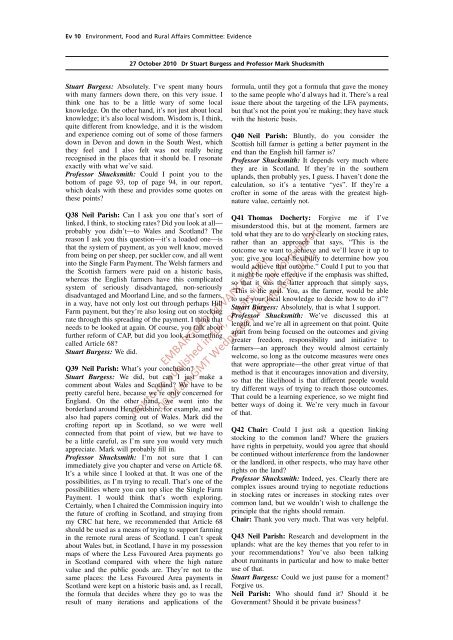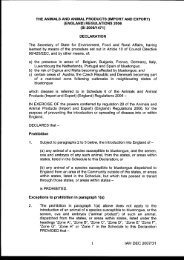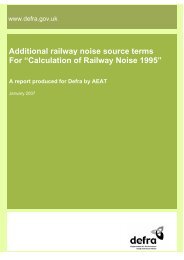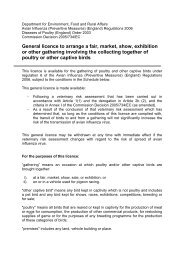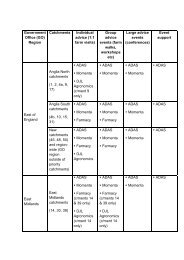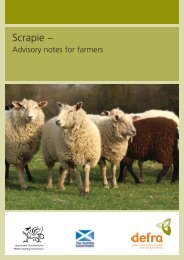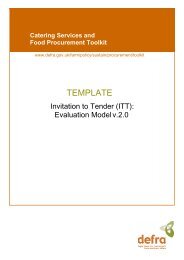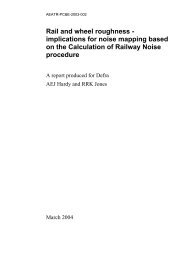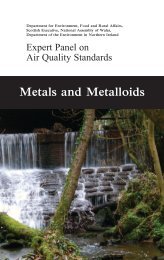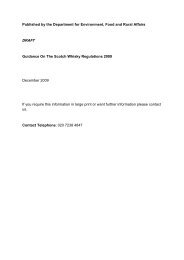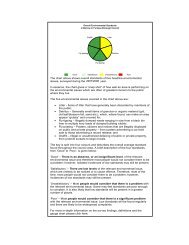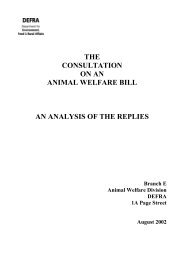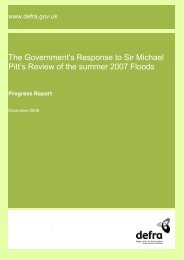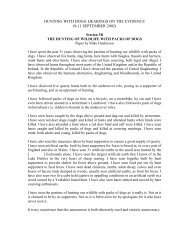Farming in the Uplands - ARCHIVE: Defra
Farming in the Uplands - ARCHIVE: Defra
Farming in the Uplands - ARCHIVE: Defra
Create successful ePaper yourself
Turn your PDF publications into a flip-book with our unique Google optimized e-Paper software.
Ev 10 Environment, Food and Rural Affairs Committee: Evidence<br />
27 October 2010 Dr Stuart Burgess and Professor Mark Shucksmith<br />
Stuart Burgess: Absolutely. I’ve spent many hours<br />
with many farmers down <strong>the</strong>re, on this very issue. I<br />
th<strong>in</strong>k one has to be a little wary of some local<br />
knowledge. On <strong>the</strong> o<strong>the</strong>r hand, it’s not just about local<br />
knowledge; it’s also local wisdom. Wisdom is, I th<strong>in</strong>k,<br />
quite different from knowledge, and it is <strong>the</strong> wisdom<br />
and experience com<strong>in</strong>g out of some of those farmers<br />
down <strong>in</strong> Devon and down <strong>in</strong> <strong>the</strong> South West, which<br />
<strong>the</strong>y feel and I also felt was not really be<strong>in</strong>g<br />
recognised <strong>in</strong> <strong>the</strong> places that it should be. I resonate<br />
exactly with what we’ve said.<br />
Professor Shucksmith: Could I po<strong>in</strong>t you to <strong>the</strong><br />
bottom of page 93, top of page 94, <strong>in</strong> our report,<br />
which deals with <strong>the</strong>se and provides some quotes on<br />
<strong>the</strong>se po<strong>in</strong>ts?<br />
Q38 Neil Parish: Can I ask you one that’s sort of<br />
l<strong>in</strong>ked, I th<strong>in</strong>k, to stock<strong>in</strong>g rates? Did you look at all—<br />
probably you didn’t—to Wales and Scotland? The<br />
reason I ask you this question—it’s a loaded one—is<br />
that <strong>the</strong> system of payment, as you well know, moved<br />
from be<strong>in</strong>g on per sheep, per suckler cow, and all went<br />
<strong>in</strong>to <strong>the</strong> S<strong>in</strong>gle Farm Payment. The Welsh farmers and<br />
<strong>the</strong> Scottish farmers were paid on a historic basis,<br />
whereas <strong>the</strong> English farmers have this complicated<br />
system of seriously disadvantaged, non-seriously<br />
disadvantaged and Moorland L<strong>in</strong>e, and so <strong>the</strong> farmers,<br />
<strong>in</strong> a way, have not only lost out through perhaps Hill<br />
Farm payment, but <strong>the</strong>y’re also los<strong>in</strong>g out on stock<strong>in</strong>g<br />
rate through this spread<strong>in</strong>g of <strong>the</strong> payment. I th<strong>in</strong>k that<br />
needs to be looked at aga<strong>in</strong>. Of course, you talk about<br />
fur<strong>the</strong>r reform of CAP, but did you look at someth<strong>in</strong>g<br />
called Article 68?<br />
Stuart Burgess: We did.<br />
Q39 Neil Parish: What’s your conclusion?<br />
Stuart Burgess: We did, but can I just make a<br />
comment about Wales and Scotland? We have to be<br />
pretty careful here, because we’re only concerned for<br />
England. On <strong>the</strong> o<strong>the</strong>r hand, we went <strong>in</strong>to <strong>the</strong><br />
borderland around Herefordshire, for example, and we<br />
also had papers com<strong>in</strong>g out of Wales. Mark did <strong>the</strong><br />
croft<strong>in</strong>g report up <strong>in</strong> Scotland, so we were well<br />
connected from that po<strong>in</strong>t of view, but we have to<br />
be a little careful, as I’m sure you would very much<br />
appreciate. Mark will probably fill <strong>in</strong>.<br />
Professor Shucksmith: I’m not sure that I can<br />
immediately give you chapter and verse on Article 68.<br />
It’s a while s<strong>in</strong>ce I looked at that. It was one of <strong>the</strong><br />
possibilities, as I’m try<strong>in</strong>g to recall. That’s one of <strong>the</strong><br />
possibilities where you can top slice <strong>the</strong> S<strong>in</strong>gle Farm<br />
Payment. I would th<strong>in</strong>k that’s worth explor<strong>in</strong>g.<br />
Certa<strong>in</strong>ly, when I chaired <strong>the</strong> Commission <strong>in</strong>quiry <strong>in</strong>to<br />
<strong>the</strong> future of croft<strong>in</strong>g <strong>in</strong> Scotland, and stray<strong>in</strong>g from<br />
my CRC hat here, we recommended that Article 68<br />
should be used as a means of try<strong>in</strong>g to support farm<strong>in</strong>g<br />
<strong>in</strong> <strong>the</strong> remote rural areas of Scotland. I can’t speak<br />
about Wales but, <strong>in</strong> Scotland, I have <strong>in</strong> my possession<br />
maps of where <strong>the</strong> Less Favoured Area payments go<br />
<strong>in</strong> Scotland compared with where <strong>the</strong> high nature<br />
value and <strong>the</strong> public goods are. They’re not to <strong>the</strong><br />
same places: <strong>the</strong> Less Favoured Area payments <strong>in</strong><br />
Scotland were kept on a historic basis and, as I recall,<br />
<strong>the</strong> formula that decides where <strong>the</strong>y go to was <strong>the</strong><br />
result of many iterations and applications of <strong>the</strong><br />
formula, until <strong>the</strong>y got a formula that gave <strong>the</strong> money<br />
to <strong>the</strong> same people who’d always had it. There’s a real<br />
issue <strong>the</strong>re about <strong>the</strong> target<strong>in</strong>g of <strong>the</strong> LFA payments,<br />
but that’s not <strong>the</strong> po<strong>in</strong>t you’re mak<strong>in</strong>g; <strong>the</strong>y have stuck<br />
with <strong>the</strong> historic basis.<br />
Q40 Neil Parish: Bluntly, do you consider <strong>the</strong><br />
Scottish hill farmer is gett<strong>in</strong>g a better payment <strong>in</strong> <strong>the</strong><br />
end than <strong>the</strong> English hill farmer is?<br />
Professor Shucksmith: It depends very much where<br />
<strong>the</strong>y are <strong>in</strong> Scotland. If <strong>the</strong>y’re <strong>in</strong> <strong>the</strong> sou<strong>the</strong>rn<br />
uplands, <strong>the</strong>n probably yes, I guess. I haven’t done <strong>the</strong><br />
calculation, so it’s a tentative “yes”. If <strong>the</strong>y’re a<br />
crofter <strong>in</strong> some of <strong>the</strong> areas with <strong>the</strong> greatest highnature<br />
value, certa<strong>in</strong>ly not.<br />
Q41 Thomas Docherty: Forgive me if I’ve<br />
misunderstood this, but at <strong>the</strong> moment, farmers are<br />
told what <strong>the</strong>y are to do very clearly on stock<strong>in</strong>g rates,<br />
ra<strong>the</strong>r than an approach that says, “This is <strong>the</strong><br />
outcome we want to achieve and we’ll leave it up to<br />
you; give you local flexibility to determ<strong>in</strong>e how you<br />
would achieve that outcome.” Could I put to you that<br />
it might be more effective if <strong>the</strong> emphasis was shifted,<br />
so that it was <strong>the</strong> latter approach that simply says,<br />
“This is <strong>the</strong> goal. You, as <strong>the</strong> farmer, would be able<br />
to use your local knowledge to decide how to do it”?<br />
Stuart Burgess: Absolutely, that is what I support.<br />
Professor Shucksmith: We’ve discussed this at<br />
length, and we’re all <strong>in</strong> agreement on that po<strong>in</strong>t. Quite<br />
apart from be<strong>in</strong>g focused on <strong>the</strong> outcomes and giv<strong>in</strong>g<br />
greater freedom, responsibility and <strong>in</strong>itiative to<br />
farmers—an approach <strong>the</strong>y would almost certa<strong>in</strong>ly<br />
welcome, so long as <strong>the</strong> outcome measures were ones<br />
that were appropriate—<strong>the</strong> o<strong>the</strong>r great virtue of that<br />
method is that it encourages <strong>in</strong>novation and diversity,<br />
so that <strong>the</strong> likelihood is that different people would<br />
try different ways of try<strong>in</strong>g to reach those outcomes.<br />
That could be a learn<strong>in</strong>g experience, so we might f<strong>in</strong>d<br />
better ways of do<strong>in</strong>g it. We’re very much <strong>in</strong> favour<br />
of that.<br />
EMBARGOED ADVANCE COPY:<br />
Not to be published <strong>in</strong> full, or part, <strong>in</strong> any form before<br />
00.01am GMT Wednesday 16 February 2011<br />
Q42 Chair: Could I just ask a question l<strong>in</strong>k<strong>in</strong>g<br />
stock<strong>in</strong>g to <strong>the</strong> common land? Where <strong>the</strong> graziers<br />
have rights <strong>in</strong> perpetuity, would you agree that should<br />
be cont<strong>in</strong>ued without <strong>in</strong>terference from <strong>the</strong> landowner<br />
or <strong>the</strong> landlord, <strong>in</strong> o<strong>the</strong>r respects, who may have o<strong>the</strong>r<br />
rights on <strong>the</strong> land?<br />
Professor Shucksmith: Indeed, yes. Clearly <strong>the</strong>re are<br />
complex issues around try<strong>in</strong>g to negotiate reductions<br />
<strong>in</strong> stock<strong>in</strong>g rates or <strong>in</strong>creases <strong>in</strong> stock<strong>in</strong>g rates over<br />
common land, but we wouldn’t wish to challenge <strong>the</strong><br />
pr<strong>in</strong>ciple that <strong>the</strong> rights should rema<strong>in</strong>.<br />
Chair: Thank you very much. That was very helpful.<br />
Q43 Neil Parish: Research and development <strong>in</strong> <strong>the</strong><br />
uplands: what are <strong>the</strong> key <strong>the</strong>mes that you refer to <strong>in</strong><br />
your recommendations? You’ve also been talk<strong>in</strong>g<br />
about rum<strong>in</strong>ants <strong>in</strong> particular and how to make better<br />
use of that.<br />
Stuart Burgess: Could we just pause for a moment?<br />
Forgive us.<br />
Neil Parish: Who should fund it? Should it be<br />
Government? Should it be private bus<strong>in</strong>ess?


